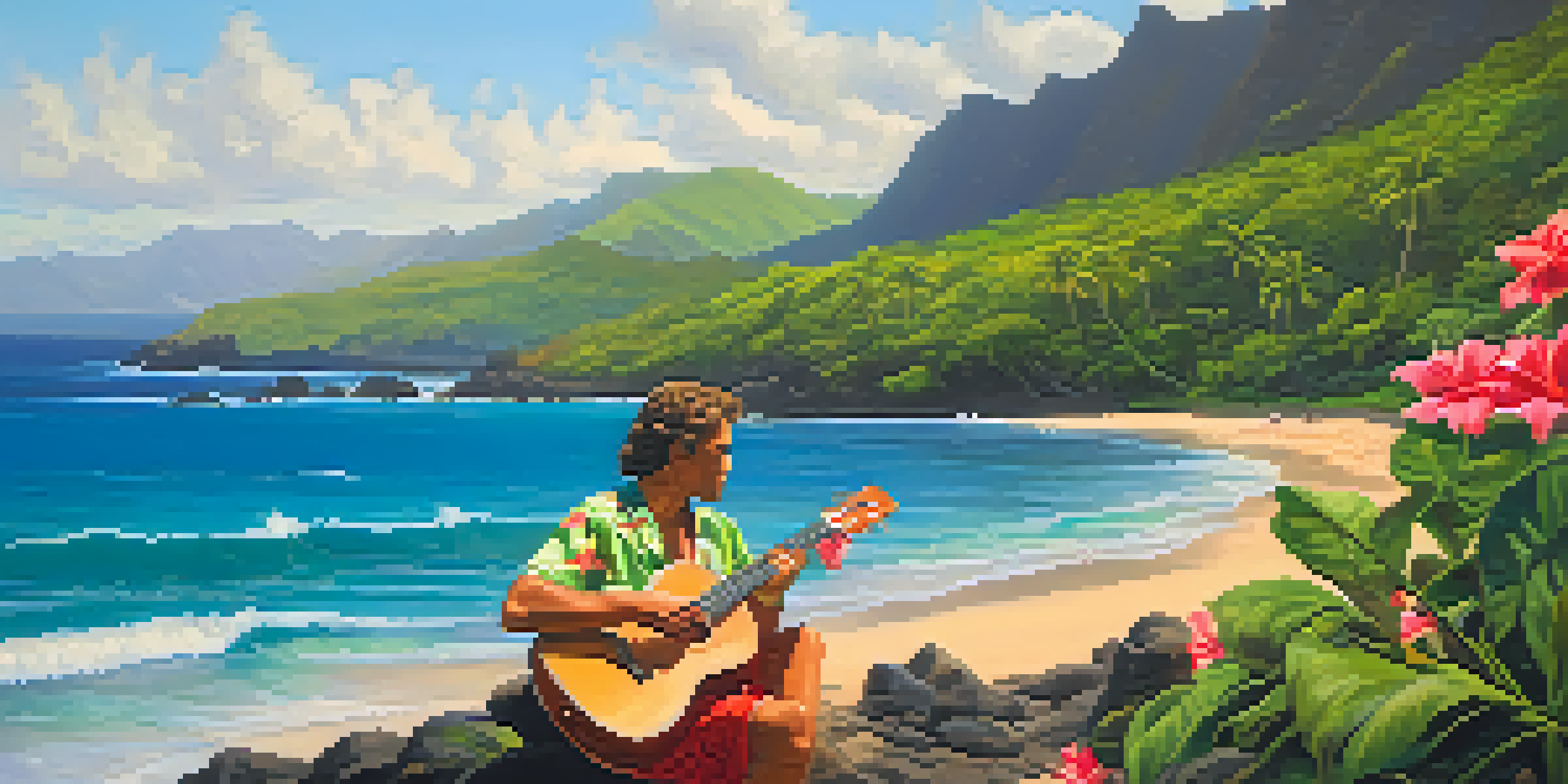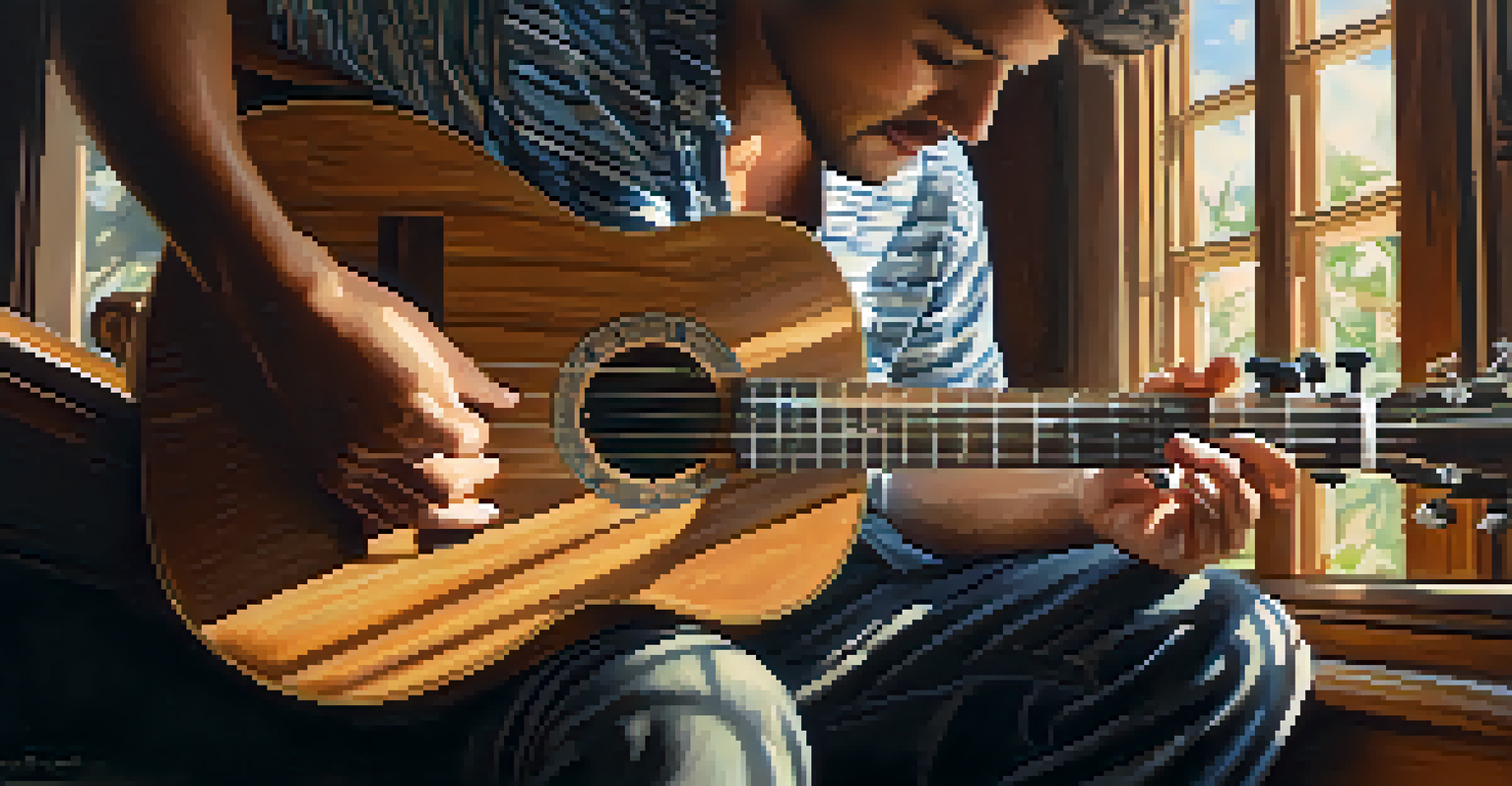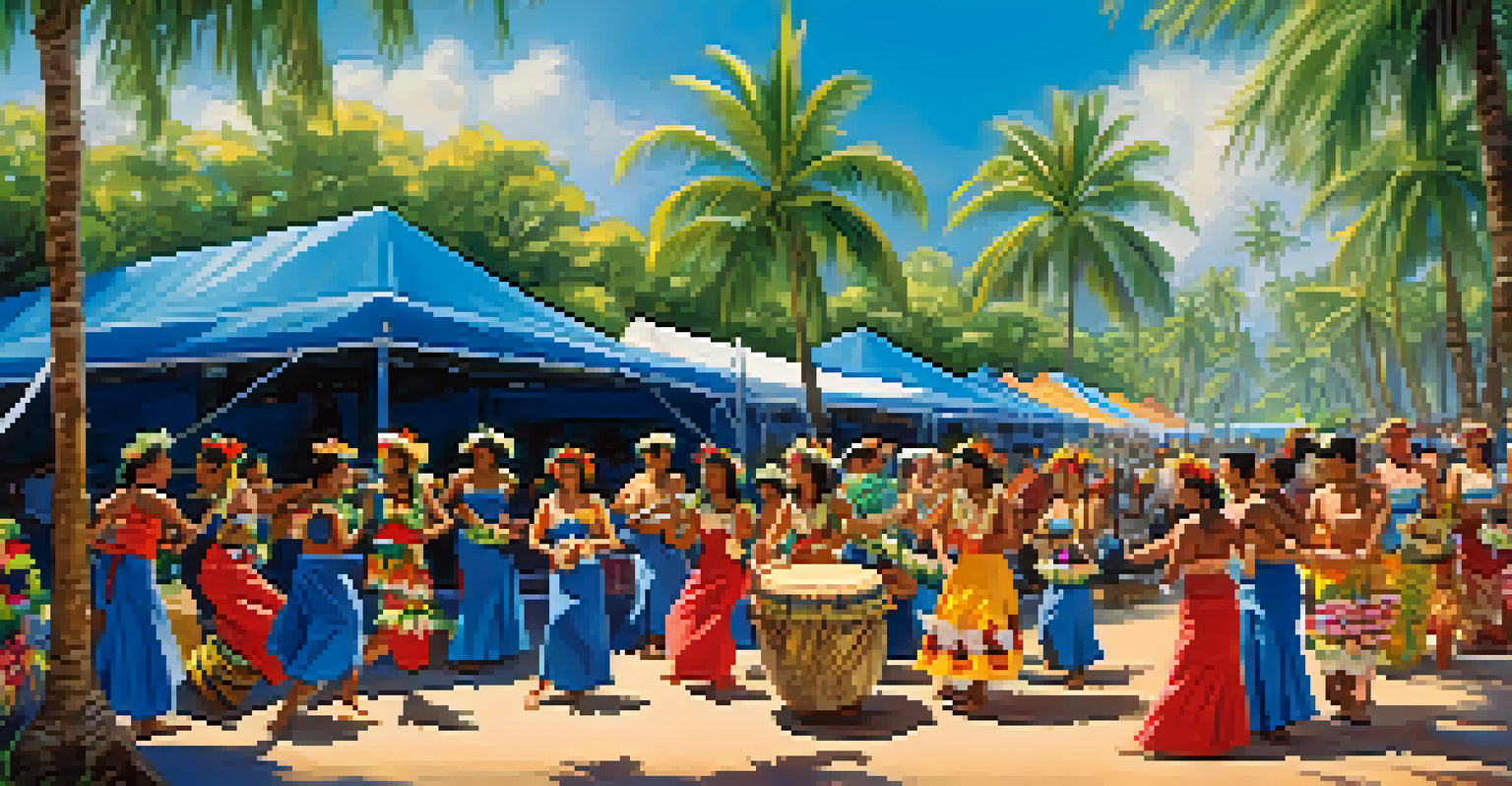The Impact of Eddie Kamae on Hawaiian Music and Ukulele Art

Eddie Kamae: A Pioneer of Hawaiian Music and Culture
Eddie Kamae was not just a musician; he was a cultural ambassador for Hawaii. Born in 1927, he dedicated his life to preserving and promoting Hawaiian music, blending traditional sounds with contemporary influences. His deep respect for the art form allowed him to connect with audiences both locally and globally, making him a beloved figure in the Hawaiian community.
Music is the universal language of mankind.
Kamae's early exposure to the ukulele and traditional Hawaiian chants inspired him to explore and elevate the genre. He understood the importance of storytelling in music, weaving narratives that resonated with the Hawaiian spirit. This passion for storytelling helped him create songs that not only entertained but also educated listeners about Hawaiian heritage.
Through his work with the group The Sons of Hawaii, Kamae helped popularize Hawaiian music in the 20th century. His performances showcased the beauty and depth of Hawaiian culture, paving the way for future generations of musicians. By blending traditional and modern styles, he made Hawaiian music accessible and appealing to a broader audience.
The Ukulele: An Instrument of Joy and Connection
The ukulele holds a special place in Hawaiian music, and Eddie Kamae was instrumental in its revival and popularization. He saw the ukulele not just as an instrument, but as a tool for connection and expression. By championing its unique sound, he inspired countless musicians to pick up the instrument and explore its possibilities.

Kamae's approach to playing the ukulele was innovative; he incorporated fingerpicking techniques that showcased the instrument's versatility. This not only enhanced his performances but also encouraged others to experiment with their playing styles. His emphasis on creativity transformed the ukulele into a symbol of joy, community, and cultural pride.
Cultural Ambassador of Hawaii
Eddie Kamae dedicated his life to preserving and promoting Hawaiian music, blending traditional and contemporary influences to connect with audiences worldwide.
Through his workshops and performances, Kamae fostered a sense of camaraderie among musicians. His encouragement helped many budding artists gain confidence and find their voice. The ukulele became a bridge that connected generations, cultures, and communities, thanks in large part to Kamae's influence.
Cultural Preservation Through Music and Film
Eddie Kamae understood the importance of preserving Hawaiian culture, and he used music and film as his mediums. In 1995, he co-founded the Hawaiian Legacy Foundation, aiming to document and promote the history of Hawaiian music. This initiative not only preserved traditional songs but also ensured that future generations would appreciate their significance.
The role of music is to connect people and tell their stories.
Kamae's documentary films, such as 'Hula: The Language of the Heart,' showcased the rich tapestry of Hawaiian music and dance. These films provided a platform for cultural expression, highlighting the stories of musicians, dancers, and the communities they represent. Through these visual narratives, he educated both locals and tourists about the depth of Hawaiian culture.
By intertwining music with film, Kamae created a lasting legacy that transcended time. His work inspired a renewed interest in Hawaiian traditions, encouraging younger generations to embrace their cultural roots. This commitment to cultural preservation has left an indelible mark on the Hawaiian community.
Collaboration and Community: A Key to Success
One of Eddie Kamae's significant contributions to Hawaiian music was his spirit of collaboration. He believed that working together with other artists would enrich the music and foster a sense of community. Throughout his career, he collaborated with various musicians, bringing together diverse influences that created a unique sound.
Kamae's openness to collaboration also extended beyond music. He was known for mentoring young musicians, sharing his knowledge and experience generously. This nurturing approach helped cultivate a vibrant music scene in Hawaii, where artists supported one another and celebrated their shared love for the art form.
Revival of the Ukulele
Kamae played a key role in popularizing the ukulele, encouraging creativity and connection among musicians through innovative playing techniques.
Through his collaborative efforts, Kamae demonstrated that music is a communal experience, one that thrives on connection and shared passion. His legacy is evident in the thriving Hawaiian music community today, where artists continue to uplift one another and keep the spirit of aloha alive.
Eddie Kamae's Influence on Contemporary Hawaiian Artists
Eddie Kamae's impact on Hawaiian music is still felt today, especially among contemporary artists. Many musicians cite him as a major influence, crediting his innovative style and commitment to cultural authenticity. His ability to blend traditional Hawaiian sounds with modern elements paved the way for a new generation of artists to explore their creativity.
Artists like Jake Shimabukuro and Israel Kamakawiwoʻole carry forward Kamae's legacy, incorporating his teachings into their own music. They honor the traditions while experimenting with new sounds, ensuring that Hawaiian music continues to evolve. This balance of respect for heritage and innovative spirit is a testament to Kamae's influence.
Moreover, Kamae's recordings and performances have become a source of inspiration for countless aspiring musicians. His ability to tell stories through music resonates with listeners, creating a deep connection that encourages others to share their own narratives. In this way, Kamae's legacy lives on, inspiring future generations to embrace and celebrate Hawaiian culture.
The Global Reach of Hawaiian Music
Eddie Kamae played a significant role in bringing Hawaiian music to a global audience. His performances and recordings introduced the beauty of Hawaiian melodies to listeners far beyond the islands. By showcasing the ukulele and traditional Hawaiian sounds, he helped to cultivate a worldwide appreciation for this unique genre.
Kamae's influence extended beyond the concert stage; he participated in festivals and cultural events around the world. These appearances not only showcased Hawaiian music but also fostered cross-cultural exchanges. By sharing the stories and traditions behind the songs, he created a deeper understanding of Hawaiian culture among diverse audiences.
Legacy of Collaboration
His spirit of collaboration enriched Hawaiian music and fostered a vibrant community of artists who continue to uplift one another today.
As a result of Kamae's efforts, Hawaiian music has become a cherished part of the global musical landscape. His legacy is evident in the growing number of musicians who incorporate Hawaiian elements into their work. This cross-pollination of cultures enriches the music scene, creating a vibrant tapestry of sounds and stories that celebrate diversity.
The Enduring Legacy of Eddie Kamae
Eddie Kamae passed away in 2017, but his legacy continues to resonate in the hearts of many. His contributions to Hawaiian music and culture have left an indelible mark that will be felt for generations to come. Through his passion, creativity, and dedication, he transformed the landscape of Hawaiian music.
Kamae's influence is evident in the thriving music scene, where artists continue to draw inspiration from his work. His commitment to cultural preservation and community-building has created a strong foundation for future musicians to build upon. This enduring legacy ensures that the beauty of Hawaiian culture remains alive and vibrant.

As we reflect on Eddie Kamae's impact, we recognize the power of music as a unifying force. His ability to connect people through song and story serves as a reminder of the importance of preserving our cultural heritage. In honoring his legacy, we celebrate the rich tapestry of Hawaiian music and the spirit of aloha that he embodied.